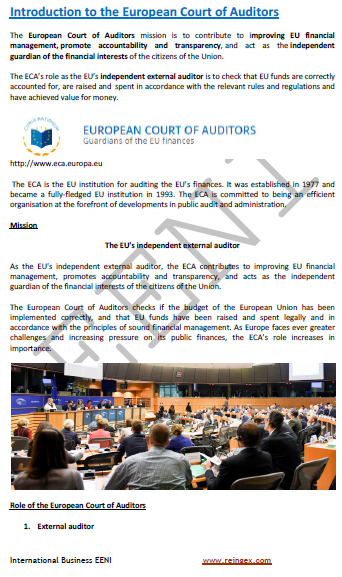European Court of Auditors (Financial)
European Court of Auditors: financial supervisor of EU
- Introduction to the European Court of Auditors of the European Union
- Role of the European Court of Auditors
Sample - European Court of Auditors:

The objective of the Subject “European Court of Auditors” is to understand the role of the European Court of Auditors as the financial supervisor of the European Union.

The Subject “European Court of Auditors” is included within the curriculum of the following academic programs at EENI Global Business School:

Masters: International Business, Foreign Trade.

Languages:  or
or  Tribunal de Cuentas UE
Tribunal de Cuentas UE  Cour des comptes UE
Cour des comptes UE  Tribunal de Contas Europeu.
Tribunal de Contas Europeu.

In 1997, the EU set up the European Court of Auditors to verify that the EU funds are used correctly and improve the financial management of the European Union.
- The European Court of Auditors acts as an “external auditor” of EU, thus ensuring the interests of EU taxpayers
- Any institution or person managing the EU funds has to be overseen by the European Court of Auditors
- It is important to note that the European Court of Auditors has no legal capacity
- The European Court of Auditors consists of one member from each EU country
- Its head office is in Luxembourg (Europe)
All Countries of EU are members of the European Court of Auditors of the European Union.

(c) EENI Global Business School (1995-2025)
Top of this page









 WhatsApp
WhatsApp